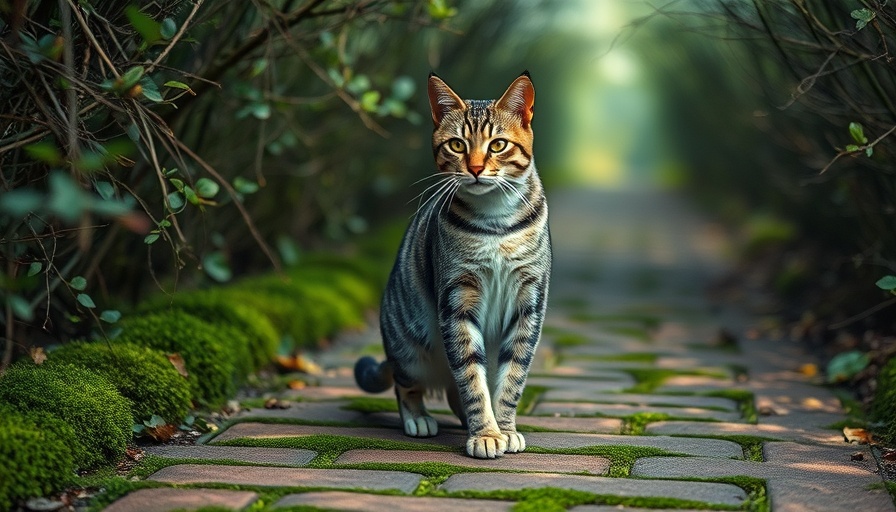
Understanding the Importance of a Pregnant Cat's Diet
When your feline friend is expecting, it’s essential to recognize that her nutritional needs escalate significantly. A pregnant cat’s diet isn’t just about quantity—it’s about quality. During her pregnancy, she requires more calories and protein to support both her energy levels and the development of her kittens. Failing to provide the proper nutrition can lead to a variety of complications, including underweight kittens or even health issues for the mother and her new litter. According to veterinary experts, prioritizing a nourishing and balanced diet can enhance the chances of healthy births and robust kittens.
The Ideal Diet for a Pregnant Cat: What You Need to Know
Many veterinarians recommend high-quality kitten food for pregnant cats, as it contains higher levels of protein and calories compared to standard cat food. This not only supports the mother’s health but also ensures that she is equipped with the necessary nutrients to nurture her developing kittens. A mixed diet of both wet and dry kitten food is advisable; while dry food aids in providing caloric density, wet food helps maintain hydration. However, it's crucial to engage with a veterinarian before making dietary changes to consider any specific health conditions that may influence your cat's diet.
Assessing Portions for Your Growing Cat
As pregnancy progresses, a cat's appetite will typically increase, often requiring up to 1.5 times more food than her usual intake. Most cats are instinctive grazers; providing them access to high-quality dry food continuously can help them regulate their intake autonomously. However, it's vital to monitor their weight weekly to prevent both excessive weight gain and unintentional weight loss. Consulting a veterinarian about healthy weight targets during pregnancy can be beneficial in recognizing any alarming changes early on.
Transitioning to a Special Diet: Best Practices
Transitioning your pregnant cat to a specially formulated diet should be done gradually. A sudden switch can lead to digestive disturbances. Begin by mixing a small amount of the new food with her existing diet, slowly increasing the ratio over a week or more. This gentle method helps her system adjust without causing undue stress. As the transition progresses, keep a close eye on her reactions to the new food. If she appears lethargic or shows signs of digestive issues, consult your vet immediately to reassess her dietary plan.
Nourishing Mom and Her Newborn Kittens
Once the kittens arrive, a mother cat's nutritional requirements don't diminish; they actually increase as she breastfeeds. Ensuring she has access to the right food is imperative for her recovery and milk production. A diet rich in nursing cat food, which also contains high protein levels, is ideal during this time. Additionally, providing fresh water and maintaining a calm environment are key factors in fostering a healthy space for both mother and her kittens.
Engaging with Professionals: Why Consultation Matters
For veterinarians, vet techs, pet nutritionists, trainers, and even pet accessory developers, understanding the importance of nutrition in pregnant cats can lead to better care practices. Advocacy for responsible breeding and ensuring the well-being of expectant mothers and their kittens must be at the forefront. There's value in sharing insights and resources amongst the community, which also includes rescue organizations and pet parent-inspired clothiers, as they can significantly contribute to the overall health of our beloved feline friends.
Common Myths about Pregnant Cat Diet
One prevalent misconception is that pregnant cats can consume regular adult cat food. While some believe that feeding a non-specialized diet is sufficient, it overlooks the crucial needs of the mother and her kittens. Providing a diet tailored to their needs not only ensures the mother remains healthy but also optimally supports the kittens as they begin their lives. Always consult a veterinarian to clarify any dietary myths and keep your expectations aligned with best practices.
Final Thought: Take Charge of Your Cat's Health
For feline guardians and pet professionals, prioritizing the health and nutritional well-being of pregnant cats can nurture more vibrant kittens and support mothers through their pregnancy journey. Embracing proper dietary practices is not just a recommendation; it’s an obligation to ensure the well-being of our feline companions. Are you ready to take proactive steps to enrich the lives of pregnant cats and their newborns? Start by assessing your current knowledge and seek resources to deepen your understanding!
 Add Row
Add Row  Add
Add 




 Add Row
Add Row  Add
Add 


Write A Comment